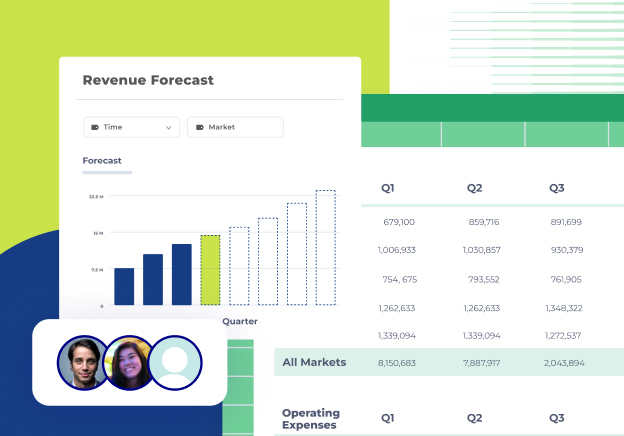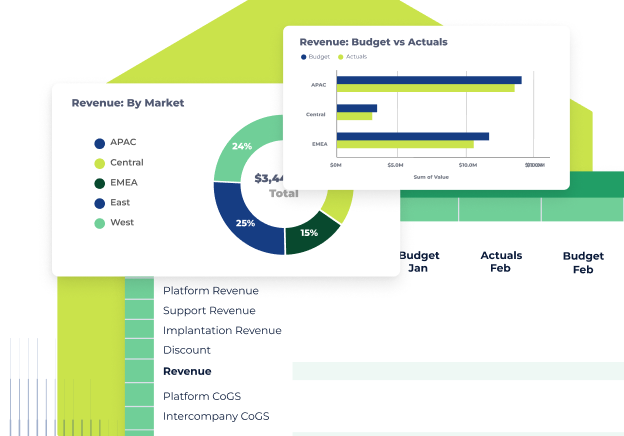What is a fractional CFO?
As the name suggests, a fractional CFO is an experienced finance professional who provides services for a business on a part-time, interim, or project basis. This role has recently gained popularity due to the increasing need for financial expertise in startups, SMBs, and project-based companies.
Financial officers are important in any type of business. They oversee financial planning, risk management, accounting, financial reporting, and more. They can also put their services to use in areas such as investment decisions, determining company valuation, and ensuring the company properly manages capital.
While having a CFO run your finance department is a smart idea, the structure of your business could indicate you don’t have the required resources to add a permanent CFO to your payroll. This is where a fractional CFO comes into play, as they don't require the full-time commitment or cost of a traditional CFO.
As stated earlier, fractional CFO services are the same as those provided by a full-time CFO—just on a part-time basis. The primary function of a fractional CFO is to work with a company's management team to oversee its financial health.

The rise of the fractional CFO
The rise in popularity of fractional CFO roles can be attributed to several factors.
Technology became a major factor, especially after the 2020 pandemic. After restrictions were lifted, most companies switched to a hybrid model, allowing personnel (including fractional CFOs) to work remotely. Now, companies can hire the best fractional CFOs on a part-time contract, irrespective of their location, and still get their desired results.
Another factor is the dynamic nature of the business environment. Businesses these days require flexibility and innovation in the management of their finances, and one thing fractional CFOs are known to be good at is flexibility. By employing fractional CFO services, flexibility will yield scalability, allowing companies to meet their financial needs based on their project cycle or requirements.
Advantages of a fractional CFO
Now that know more about what a fractional CFO does, let's go over some key benefits of hiring fractional CFOs.
1. Flexibility
One advantage of hiring or partnering with a fractional CFO is flexibility. The scalability that comes along with a CFO's flexibility is invaluable. For instance, as your business goes through different phases, the fractional CFO will adjust their involvement to match your needs. This way, your business will have access to top-tier financial services at every stage without breaking the bank. This flexibility can be particularly beneficial for startups and small businesses.
2. Access to top-tier talent at a fraction of the cost
An experienced CFO will bring a wealth of experience to your business. Bringing on a full-time CFO can be a big financial step, especially for a growing business. By opting for a fractional CFO, you gain access to this wealth of experience for a fraction of what a full-time CFO would cost. With the money save, you can invest more resources into other areas of operations.
3. Diverse experience from working with multiple companies
One of the key benefits of hiring a fractional CFO is the diverse experience they bring. Having worked with multiple companies, fractional CFOs have a broad knowledge of several industries and business frameworks. This expertise then gets channeled into your business, helping to drive growth and success.
4. Expertise in financial systems and processes
A fractional CFO can be a game-changer for efficiency by introducing time-saving FP&A software, developing clear financial policies, and monitoring cash flow. Moreover, their expertise can help businesses improve their financial reporting. By providing accurate and timely financial information, companies can make better-informed decisions and improve their financial performance.
5. Strategic FP&A
Another benefit of bringing a fractional CFO on board is their ability to help corporations achieve their overall business goals. This is done with strategic planning and analysis, including budgeting, forecasting, and capital structure planning. With all these implemented, you will be able to identify areas of inefficiency and know how to improve profitability with the resources available.
6. Access to a professional network
Having worked with multiple companies, fractional CFOs have developed relationships with many financial professionals, including bankers, lawyers, and investors. This network can be invaluable for your businesses in several areas, such as raising capital and negotiating contracts. That's only part of it, as this professional network could open your business to new opportunities such as a new market, partnership, or investment opportunities.

Understanding the full-time CFO role
A full-time CFO plays various roles that are essential to a company's financial stability. As a senior executive, the CFO oversees strategic planning, monitoring cash flow, and assessing the company's strengths and shortcomings, all while suggesting steps to fix them.
In larger firms, the CFO's responsibility broadens to a strategic partner status with the CEO. A full-time CFO's job is to preside over all the organization's financial operations, as well as the day-to-day activities of economic decision-making, such as investment strategies, contract negotiations, budgeting, tax matters, and regular audits.
Most full-time CFO benefits are often seen in larger, more sophisticated companies. These businesses need a committed expert to oversee their vast operations, greater workforces, and bigger budgets. Additionally, they have more stakeholders who want accurate and timely financial reporting frequently.
These businesses are usually conglomerates with firms across the globe. The finance department is generally larger and more complex, with its presence in several markets or countries. If you operate a conglomerate, you must comply with different laws, manage forex risks, and more. A full-time CFO will dedicate all their time and experience to helping you run a smooth financial department across the board.
Larger firms are also more prone to complex financial difficulties, such as mergers and acquisitions, capital raising, and financial reporting. These difficulties often necessitate the involvement of a full-time CFO who can provide strategic counsel, manage risks, and assure compliance with financial regulations.
Advantages of a full-time CFO
As established above, any business can benefit from the greater financial insight of a full-time CFO. Now, let's examine some benefits of hiring one.
1. In-depth understanding of the company's financial health and operations
A full-time CFO's job involves having an in-depth understanding of the company's finances. Overseeing the financial aspect of the company's operations, the CFO can make informed decisions to sustain financial health, identify waste areas, and implement strategies to optimize financial resources.
2. Continuous leadership and vision for the company's financial strategy
A full-time CFO plays a crucial role in shaping the financial strategy to align with the company's long-term goals. By providing consistent leadership, they ensure that the finance department effectively implements these strategies. Moreover, they remain readily available to make necessary adjustments, ensuring the company stays on course to meet its financial objectives. Their strategic vision is key to identifying and pursuing growth opportunities.
3. Stability and long-term commitment to organizational growth
A full-time CFO brings both consistency and a deep commitment to expanding the business. As they develop an in-depth understanding of the entire business model and industry trends, this comprehensive insight allows them to initiate meaningful discussions and suggest strategies that drive growth. Their long-term dedication also helps build strong, trusting relationships with stakeholders, improving cooperation and communication. These relationships are vital for fostering an environment that contributes to the company's success.
4. Direct involvement in company operations
The CFO's direct involvement in operations allows them to track cash flow, analyze strengths and weaknesses, and propose corrective action plans when necessary. Their direct involvement also enables them to build strong relationships with other departments, improving cross-functional collaboration.
5. Ability to influence company culture
By promoting a culture of financial responsibility and accountability, CFOs ensure that all employees understand the importance of financial management. A key benefit is the increased organizational transparency this brings to the company. Employees are encouraged to provide regular financial updates and reviews, keeping stakeholders and investors informed about the company’s financial performance.
6. Development and training of the finance team
Lastly, a full-time CFO can offer direction and mentoring, aiding the team's skill development. Their presence inspires and motivates the group, fostering a sense of security through steady leadership and guidance. Their participation in training guarantees that the business's financial policies and procedures are followed consistently, enhancing the efficacy and efficiency of the organization's financial operations.
Fractional or full-time CFO: which is right for your business?
So, the question remains—should you hire a full-time or a fractional CFO? To be sure you make the right decision, several factors must be considered, including:
Cost
The financial implications of hiring a full-time CFO versus a fractional CFO can be significant. Before making this decision, consider your budget. Review your finances and determine whether you can support the salary, benefits, and associated expenses of hiring a full-time CFO.
Your company may only need a full-time CFO once it scales up. Fractional CFOs are typically more cost-effective, especially for small to medium-sized businesses. You pay for the Fractional CFO roadmap and services as needed, reducing salary, benefits, and overhead costs.
Scope of work
Evaluate the specific financial issues and goals that your organization faces. A full-time CFO may be the best choice if you need ongoing, comprehensive financial leadership. They can provide day-to-day financial structuring and a deep understanding of your company's financial operations.
However, if yours is a project-based or a smaller company, a fractional CFO will be more cost-effective. They can provide the necessary financial expertise without the commitment of a full-time role. They will also be more willing to work virtually/remotely because their position is part-time.
Growth stage
Consider your company's growth stage to determine the type of CFO you need. For example, smaller or early-stage businesses may find fractional CFOs more ideal as they are cost-effective. By just paying for their services when needed, you can cut expenses associated with benefits and compensation.
However, a full-time CFO may be necessary as your company grows and the financial operations become more complex. They can provide the continuous financial leadership required to navigate growth challenges.
Industry specifics
The choice between hiring a full-time CFO and a fractional CFO can greatly depend on the specific needs and stage of your industry. Fractional CFOs bring a vast range of experience from different industries and business models, making them ideal for companies that need strategic financial guidance without the commitment of a full-time position. This flexibility allows you to choose a fractional CFO whose expertise is precisely aligned with your company's current challenges and objectives.
In contrast, a full-time CFO provides deep, ongoing engagement with your company. They dedicate themselves entirely to understanding and integrating into your company’s operations, culture, and industry-specific challenges. With this in-depth involvement, a full-time CFO can develop more tailored and potentially more effective financial strategies that are closely aligned with your long-term business goals and the particular demands of your industry.
Conclusion: fractional or full-time
Remember, the decision between hiring a fractional CFO or a full-time CFO should be based on your company's goals, budget, and financial needs. Be sure to carefully assess your company's specific circumstances to determine which choice makes the most sense for you.
Want to learn more about the benefits a fraction CFO can provide? Visit Fresh FP&A today. Then, be sure to request a free Cube demo to find out how FP&A software can level up your finance function!



.png)








.png)






